GENERAL GEORGE PICKETT CONFEDERATE #466 2018 1/1ESI Civil War PSA/DNA AUTOGRAPH
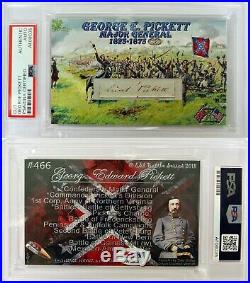
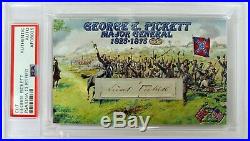
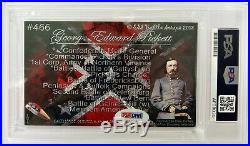
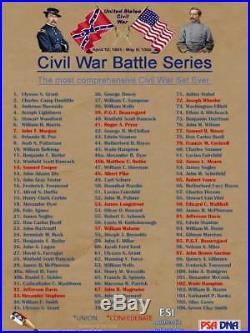
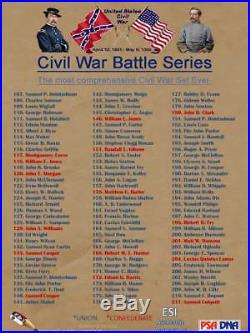
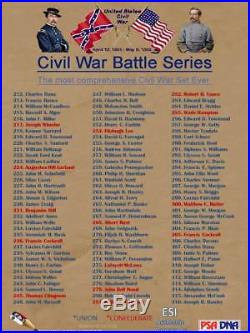
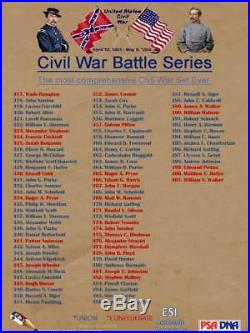

GENERAL GEORGE PICKETT CONFEDERATE #466 2018 1/1ESI Civil War PSA/DNA AUTOGRAPH SIGNED LIEUT. A VERY RARE CHANCE TO GET ONE OF THE MOST FAMOUS GENERALS IN THE WAR AND RESPONSIBLE FOR CLOSEST THE CONFEDERACY GOT TO VICTORY. A beautiful Card with original one of one signature/autograph. Authenticated and slabbed/encapsulated by PSA/DNA.
Card and autograph are protected forever! Also includes the companion LOA for added provenance signed by the President of PSA! Please keep in mind the expensive process of authentication. The finest set of Civil War cards ever produced and that I have ever come across. Pictures are not included, just the card and LOA.Verify any PSA autograph here. From Wikipedia, the free encyclopedia. This article is about the American Confederate general. For the British physicist, see George Pickett (physicist).
Pickett's Division, First Corps. George Edward Pickett January 16. 1825 July 30, 1875 was a career United States Army.Officer who became a major general. In the Confederate States Army. During the American Civil War.
He is best remembered for leading Pickett's Charge. The futile and bloody Confederate offensive on the third day of the Battle of Gettysburg. Pickett graduated dead last out of 59 cadets in the United States Military Academy.
He served as a second lieutenant. In the United States Army during the MexicanAmerican War. And is noted for his service in the Battle of Chapultepec. After this, he served in the Washington Territory.
And eventually reached the rank of captain. Pickett participated in the Pig War. Near the beginning of the American Civil War. He enlisted in the Confederate States Army.
And he attained the rank of brigadier general. He commanded a brigade that saw heavy action during the Peninsula Campaign. Pickett was wounded at the Battle of Gaines's Mill. He did not return to command until September, following the Battle of Antietam. When he was given command of a division in the Right Wing of the Army of Northern Virginia.
In the command of Major General James Longstreet. Which became the I Corps. His division was lightly engaged at the Battle of Fredericksburg.
And, along with most of Longstreet's Corps, missed the Battle of Chancellorsville. While participating in the Suffolk Campaign. His division was, much to Pickett's frustration, the last to arrive on the field.
However, it was one of three divisions under the command of General Longstreet to participate in a disastrous assault on Union positions on July 3, the final day of the battle. The attack has been given the name "Pickett's Charge". In February 1864, Pickett ordered 22 North Carolinians in Union uniform hanged as deserters, after a failed assault on New Berne.
Brigadier General John Peck sent Pickett a note telling him the men were US soldiers and should be treated as prisoners of war. Pickett thanked him for giving him the names, as he now knew who he was hanging. His military career came to an inglorious end when his division was overwhelmed and defeated at the Battle of Five Forks. Following the war, Pickett feared prosecution for his execution of deserters and temporarily fled to Canada. An old Army friend, Ulysses S. He died at age 50 in July 1875 from an "abscess of the liver". George Edward Pickett was born in his grandfather's shop in Richmond, Virginia. On January 16, 1825 and raised on his family's plantation at Turkey Island. He was the first of the eight children of Robert and Mary Pickett. A prominent family of Old Virginia of Huguenot. He was the cousin of future Confederate general Henry Heth. For a time in the 1840's Pickett lived and served as a law clerk for his uncle Andrew Johnston in Quincy, Illinois. He went to Springfield, Illinois. To study law, but at the age of 17 he was appointed to the United States Military Academy. Legend has it that Pickett's appointment was secured for him by Abraham Lincoln.But this is largely believed to be a story circulated by his widow following his death. Lincoln, as an Illinois state legislator, could not nominate candidates, although he did give the young man advice after he was accepted. Pickett was actually appointed by Illinois Congressman John T. A friend of Pickett's uncle and a law partner of Lincoln.
Pickett was popular as a cadet at West Point. He was mischievous and a player of pranks, a man of ability, but belonging to a cadet set that appeared to have no ambition for class standing and wanted to do only enough study to secure their graduation. At a time when often a third of the class left before graduation, Pickett persisted, working off his demerits and doing enough in his studies to graduate, ranking last out of the 59 surviving students in the Class of 1846. It is a position held with some backhanded distinction, referred to today as the "goat", both for its stubbornness and tenacity. Pickett's cousin Henry Heth graduated last in the Class of 1847. Pickett was commissioned a brevet. Second lieutenant in the 8th Infantry Regiment.He soon gained national recognition in the MexicanAmerican War. When he carried the American colors over the parapet during the Battle of Chapultepec. Wounded at the base of the wall, Pickett's friend and colleague Lieutenant James Longstreet. Pickett carried the flag over the wall and fought his way to the roof of the palace, unfurling it over the fortress and announcing its surrender.
He received a brevet promotion to captain following this action. In 1849, while serving on the Texas frontier after the war, he was promoted to first lieutenant. In the 9th Infantry Regiment. In 1853, Pickett challenged a fellow junior officer, future Union general Winfield Scott Hancock. To a duel; (they had met only briefly when Hancock was passing through Texas).Hancock declined the duel, a response not unlikely as dueling had fallen out of favor at the time. In January 1851, Pickett married Sally Harrison Minge, the daughter of Dr. John Minge of Virginia, the great-great-grandniece of President.
And the great-great-granddaughter of Benjamin Harrison V. A signer of the United States Declaration of Independence. Sally died during childbirth that November, at Fort Gates. Pickett next served in the Washington Territory. In 1856 he commanded the construction of Fort Bellingham. On Bellingham Bay, in what is today the city of Bellingham, Washington. He also built a frame home that year which still stands; Pickett House. Is the oldest house in Bellingham and the oldest house on its original foundation in the Pacific Northwest.While posted to Fort Bellingham, Pickett married a Native American woman of the Haida tribe, Morning Mist, who gave birth to a son, James Tilton Pickett (18571889); Morning Mist died a few months later. "Jimmy" Pickett made a name for himself as a newspaper artist, before dying of tuberculosis at the age of 32 near Portland, Oregon. In 1859, Pickett was dispatched in command of Company D, 9th US Infantry, to garrison San Juan Island. In response to discord that had arisen there between American farmers and the Hudson's Bay Company. The confrontation, known as the Pig War (1859).
, was instigated when American farmer Lyman Cutler shot and killed a pig that had repeatedly broken into his garden. The pig belonged to the Hudson's Bay Company, and though Cutler was prepared to pay a fair price for the pig, the Company was not satisfied, insisting he be brought before the British magistrate, thus initiating the territorial dispute that came to be known as the Pig War. In response to the U.
Forces, the British sent a force of three warships and 1000 men. The British commander demanded that Pickett and his men leave. Pickett with his 68 men appeared to be fully prepared to oppose a British landing, ordering them into a line of battle near the beach. "Don't be afraid of their big guns, " he told his men, We'll make a Bunker Hill. Pickett's presence and determination prevented the landing, the British being under orders to avoid armed conflict with United States forces, if possible.
Pickett had set up camp and his battery of cannon near the Hudson's Bay Company. S Belle Vue Sheep Farm, and directly under the cannons of the British. Having this error pointed out to him, he moved the camp and battery a few miles north to high ground, to a spot overlooking Griffin Bay and the Strait of Juan de Fuca. After initial tensions passed the crisis was averted, both sides being unwilling to go to war over a pig. Dispatched Brevet Lieutenant General Winfield Scott.To negotiate a settlement between the parties. There is also some controversy that Pickett and General William S. Maneuvered behind the scenes to provoke a war between the United States and Britain, to distract the North, allowing the South to seek independence or, as General George B. Said, to unite the North and South. See also: Pig War (1859) § Background.
On April 19, after the firing on Battle of Fort Sumter. And in response to President Lincoln's call for 75,000 volunteers to suppress the rebellion, Virginia joined three more Southern states in seceding. Native son Pickett sailed from San Juan Island. Resign his commission and was told by his commander that he had to resign it in Washington, D. To accomplish this he sailed to Fort Steilacoom. Trekked 40 miles overland to Colon. To obtain a commission in the Army of Northern Virginia. And then to Washington, D. To turn in his resignation.Arriving after the First Battle of Bull Run. He resigned his commission in the U. Army on June 25, 1861; he had been holding a commission as a major. In the Confederate States Army Artillery since March 16.
Within a month he was appointed colonel. In command of the Rappahannock. Line of the Department of Fredericksburg, Virginia.
Under the command of Major General. Holmes's influence obtained a commission for Pickett as a brigadier general.
Confederate Major General George E. Pickett made a colorful general. He rode a sleek black charger named "Old Black, " and wore a small blue kepi-style cap, with buffed gloves over the sleeves of an immaculately tailored uniform that had a double row of gold buttons on the coat, and shiny gold spurs on his highly polished boots. He held an elegant riding crop whether mounted or walking. His moustache drooped gracefully beyond the corners of his mouth and then turned upward at the ends.
His hair was the talk of the Army: long ringlets flowed loosely over his shoulders, trimmed and highly perfumed, his beard likewise was curling and giving up the scent of Araby. Pickett's first combat command was during the Peninsula Campaign. Leading a brigade that was nicknamed the Gamecocks the brigade would eventually be led by Richard B. Pickett led his brigade ably in the battles of Williamsburg.
Earning commendations from his superiors. On June 27 he was shot off his horse while leading his brigade in its first assault.
Pickett continued to move forward with his men for a while, leading his horse on foot. A second assault by Pickett's brigade, led by Colonel Eppa Hunton. Along with the brigade led by Cadmus M. Pickett feared that he had taken a mortal blow to his shoulder, but the wound was initially assessed by others as minor.
The shoulder wound turned out to be severe enough that, while not fatal, Pickett was out of action for the next three months, and his arm would remain stiff for at least a year. He was given command of a two-brigade division. In the corps commanded by his old colleague from Mexico, Major General Longstreet. Pickett was promoted to major general on October 10. Shortly afterwards his division was upgraded to five brigades, commanded by Generals Garnett, James Kemper.
The division was only lightly engaged at the Battle of Fredericksburg. His division would not see serious combat until the Gettysburg Campaign.
Longstreet and two of his divisions-those commanded by Pickett and John Bell Hood. Were detached from Lee's main army in April while participating in the Suffolk Campaign. They thus missed the Battle of Chancellorsville. The Suffolk Campaign was minor and inconclusive, while the Battle of Chancellorsville was an enormous Confederate victory.
Before the Gettysburg Campaign, Pickett fell in love with a Virginia teenager, LaSalle "Sallie" Corbell. Although Sallie would later insist that she met him in 1852 (at age 9), she did not marry the 38-year-old widower until November 13, 1863. The couple had two children, George Edward Pickett, Jr. And David Corbell Pickett (born 1865 or 1866).David died in late 1873 or January 1874. At Suffolk, Longstreet grew impatient with Pickett's frequent trips away from his division to see Sallie at her home in nearby Chuckatuck. Pickett then decided to ask for permission for the visits from Longstreet's chief of staff, Moxley Sorrel. Who referred him to Longstreet.
Instead of asking Longstreet, Pickett went without permission. After the war, Sorrel commented, I don't think his division benefitted by such carpet-knight doings in the field. Gettysburg and Pickett's Charge.
Main article: Pickett's Charge. Pickett's division arrived at the Battle of Gettysburg. On the evening of the second day, July 2, 1863. It was reduced to 3 brigades present, Corse's still being detached in Virginia and Jenkins' transferred. It had been delayed by the assignment of guarding the Confederate lines of communication through Chambersburg, Pennsylvania.
After two days of heavy fighting, General. S Army of Northern Virginia. Which had initially driven the Union Army of the Potomac.
To the high ground south of Gettysburg, had been unable to dislodge the Union soldiers from their position. Lee's plan for July 3 called for a massive assault on the center of the Union lines on Cemetery Ridge. Calculating that Meade had concentrated his forces to protect his flanks while leaving his center weak. Lee directed General Longstreet to assemble a force of three divisions for the attacktwo divisions from the corps of Lieutenant General A. Under the temporary command of J.And Major General Isaac R. Which had both seen action on July 1, and Pickett's fresh division from Longstreet's own corps.
The center was occupied by the Union II Corps. Commanded by Major General Winfield Scott Hancock. Longstreet was technically in command, not Pickett. Nevertheless, the attack became known as "Pickett's Charge". In addition, much of the mythology of the Charge arose from newspaper reports.
As Pickett was the only major general from Virginia to participate in the charge, the Virginia newspapers both played up their native son's role and made the assault a more "glamorous" event. Following a two-hour artillery barrage meant to soften up the Union defenses, the three divisions stepped off across open fields almost a mile from Cemetery Ridge. Pickett inspired his men by shouting, Up, Men, and to your posts! Don't forget today that you are from Old Virginia. Pickett's division, with the brigades of Brigadier Generals Armistead, Garnett, and Kemper, was on the right flank of the assault.It received punishing artillery fire, and then volleys of massed musket fire as it approached its objective. Armistead's brigade made the farthest progress through the Union lines. Armistead was mortally wounded, falling near "The Angle", at what is now termed the High Water Mark of the Confederacy.
Neither of the other two divisions made comparable progress across the fields; Armistead's success was not reinforced, and his men were quickly killed or captured. S Battle of Gettysburg , showing Pickett's Charge. Pickett's Charge was a bloodbath. While the Union suffered 1,500 casualties, the Confederates had over 6,000. Over 50% of the men sent across the fields were killed or wounded.Pickett's division alone, out of about 5,500 men, lost 224 killed, 1,140 wounded, and 1,499 missing/captured. Pickett's three brigade commanders and all thirteen of his regimental commanders were casualties. Kemper was wounded, Garnett killed, and Armistead mortally wounded.
Trimble and Pettigrew were the most senior casualties of the entire Confederate assault, the former losing a leg and the latter wounded in the hand and later mortally wounded during the retreat to Virginia. Pickett has received some historical criticism for establishing his final position well to the rear of his troops. Friend, who served Pickett as a courier, defended Pickett by writing that he went as far as any Major General, Commanding a division, ought to have gone, and farther.
As soldiers straggled back to the Confederate lines along Seminary Ridge, Lee feared a Union counteroffensive and tried to rally his center, telling returning soldiers that the failure was all my fault. When Lee told Pickett to rally his division for the defense, Pickett allegedly replied, General Lee, I have no division. Pickett's official report for the battle has never been found.
While it is rumored that Lee rejected it for its bitter negativity and demanded that it be rewritten, an updated version was never filed. After the Battle of Gettysburg, Pickett commanded the Department of Southern Virginia and North Carolina. In February, Pickett was ordered to capture New Bern, North Carolina. The subsequent Battle of New Bern.
Resulted in a Confederate defeat. Following the battle, Pickett ordered the execution of 22 United States Army soldiers from North Carolina who were captured during the failed raid. Confederates claimed they were merely executing deserters.
In fact many of the US soldiers put to death offered good evidence that they refused service in the Confederate States Army, serving only in the North Carolina home guard on the basis of refusing to take up arms against the United States. Overland Campaign and Siege of Petersburg. Following the New Bern battle, Pickett served as a division commander in the Defenses of Richmond.In the Bermuda Hundred Campaign. Pickett's division was detached in support of Robert E. Lee's operation in the Overland Campaign. Just before the Battle of Cold Harbor. In which Pickett's division occupied the center of the defensive line, a place in which the main Union attack did not occur.
His division participated in the Siege of Petersburg. General Pickett had received orders from Robert E. Lee to, with the Cavalry divisions of Major Generals William Henry Fitzhugh Lee. Hold the vital railroad crossing at Five Forks at all costs. On April 1, at the Battle of Five Forks.
Their troops were attacked by a combined force under Major General Philip Henry Sheridan. Which consisted of the V Corps. Of the Army of the Potomac, commanded by Major General Gouverneur K. Of the Army, commanded by Brigadier General Wesley Merritt.
Lee, and Rosser were located behind the lines of their troops at the time of the attack, enjoying a shad. Bake while failing to inform their subordinate officers of their location. Meanwhile, Warren's troops overwhelmed Pickett's left flank, and the Cavalry troops pinned the Confederates down elsewhere. By the time the Confederate commanders realized the catastrophe, it was too late to prevent the defeat. The result of the battle, as well as that of the Third Battle of Petersburg.
The following day, forced Lee to abandon his entrenchments at Petersburg, leading to the capture of Richmond and surrender of his army on April 9. A controversy existed over whether or not Pickett was relieved of his command in the final days of the war. After the war, Lee's Chief of Staff, Lieutenant Colonel Walter H.
Wrote that following the Battle of Sayler's Creek. On April 6, 1865, he had issued orders for Lee relieving Major Generals Richard H. Whose forces had been lost in the battle and who thereby no longer had troops under their command. In addition, Taylor recollected that he had issued an order relieving Pickett as well. Pickett's division was still intact, though reduced in number to about the size of a brigade.No copies of these orders exist. A biographer of Lee, supported this assertion, writing in 1935 that at the same time Lee relieved Anderson of command, he took the same action regarding Pickett and Bushrod Johnson.
But the order regarding Pickett apparently never reached him. As late as April 11, he signed himself, Maj. In contradiction to this assertion, in his 1870 book Pickett's Men Walter Harrison reprinted an order from Lieutenant Colonel Taylor to Pickett dated April 10, 1865, in which Taylor addressed Pickett as Maj Gen G E Picket sic. , General Commanding The order was a request for an account of the movements and actions of Pickett's Division from the time of the Battle of Five Forks on April 1 to the surrender at Appomattox on April 9. In the report Pickett submitted, he said.
The second day after the battle referred to (Five Forks) not being able to find General Anderson's headquarters, I reported to Lieut. Longstreet, and continued to receive orders from him until the army was paroled and disbursed. Pickett's official report to Taylor was signed G. This is the April 11 report mentioned by Freeman above. Thus in Pickett's official report to Taylor he speaks of commanding his men and interacting with his superior officer right up until the surrender at Appomattox.
Taylor attempted to explain the apparent contradiction by telling Fitzhugh Lee. That he addressed his request in the manner he did because Pickett was not dismissed from the Army, and for the period in question, Pickett was initially in command. This explanation, however, leaves unanswered the question of how Taylor expected Pickett to answer for the period of time Pickett purportedly was not in command.
The explanation does not explain Pickett's report which covered the entire period, nor the fact that Pickett signed the report as the acting commander, nor did it explain Longstreet's interactions with Pickett over this period of time. Furthermore, there is no record of Taylor requesting reports from any other officers dismissed from the service on the movements of their former troops, nor of his referring to such officers in a manner which would connote active command. The medical officer of Pickett's division, Dr. Elzey, was with Pickett at the time of these events.
When an elderly Colonel John S. Raised this issue in 1911, Elzey wrote a letter to the Richmond Times-Dispatch. I was General Pickett's personal medical advisor, and continued to be such until the time of his death. We rode together a greater part of the way during the retreat of our army from Petersburg to Appomattox. We escaped together from the battlefield at Sailor's Creek and were constantly together until we reached Appomattox.
In Longstreet's final report, he makes no mention of Pickett or his division. Nor does Longstreet mention any other officer being in charge of the unit, norPickett commanded the men remaining in his division and reported to Longstreet. These men surrendered with Pickett at Appomattox. Regarding Pickett and his division, no source can be produced which asserts anything otherwise.
On April 9, Pickett commanded his remaining troops in the Battle of Appomattox Courthouse. Forming up in the final battle line of the Army of Northern Virginia.
He surrendered with Lee's army and was paroled at Appomattox Court House on April 12, 1865. A legend told by Pickett's widow stated that when the Union Army marched into Richmond, she received a surprise visitor. He acted graciously and inquired whether he had found the Pickett house. Abraham Lincoln himself, the story goes, had come to determine the fate of an old acquaintance before the wars, and Sallie, astonished, admitted she was his wife and held out her infant for the president to cradle. Prokopowicz has called this story a "fantasy".
Pickett's execution of 22 captured Union Army soldiers, from North Carolina at New Bern, was then under investigation. Pickett, fearing prosecution, fled with his wife and son to Canada. Testimony at the hearings, including that of wartime North Carolina Governor Zebulon Vance.Alleged that at least some of the executed men had belonged to local militias and been unwillingly transferred to the regular Confederate army in "violation of their enlistment agreement, " and thus should not have been treated as deserters and shot. Pickett remained out of the country for a year until hearing that, at the recommendation of Ulysses S. On June 23, 1874, House Resolution 3086, an act to remove the political disabilities of George E. Pickett of Virginia, was passed by the U.
Pickett was granted a full pardon, about a year before his death. Pickett lamented his men, lost in great number at Gettysburg. Late in his life, Colonel John S.
Who had served under General J. Was present when Lee and Pickett met briefly after the war.
He claimed their interaction was cold and reserved. Others present at the meeting disputed this, stating Lee only acted in his usual reserved and gentlemanly fashion. Pickett, Mosby said, complained bitterly to him after this meeting that That man destroyed my division. Mosby allegedly replied, Yes, but he made you immortal.
Most historians find the encounter as Mosby interpreted it unlikely. Asked by reporters why Pickett's Charge failed, Pickett frequently replied, I've always thought the Yankees had something to do with it. Pickett died in Norfolk, Virginia, on July 30, 1875.The cause of death was a liver abscess. Although whether it was alcohol-related, amoebic. He was initially interred in Cedar Grove Cemetery.
His remains were disinterred on October 23 and he was buried in Hollywood Cemetery. In Richmond, Virginia on October 24, 1875.
More than 40,000 people lined the funeral route, while another 5,000 marched in the funeral procession. A memorial to Pickett was erected over his grave site and dedicated on October 5, 1888. The memorial was not, however, placed directly above Pickett's burial site, and the exact location of his remains is not clear. LaSalle Corbell Pickett died on March 22, 1931, having outlived her husband by more than 55 years.Initially, Hollywood Cemetery declined to allow her to be buried next to her husband. Pickett's grandson, Lieutenant George E. Threatened to have his grandfather disinterred and moved to Arlington National Cemetery. Where both grandparents could be buried side-by-side.
Hollywood Cemetery quickly agreed to permit LaSalle's interment at Hollywood. But this did not immediately occur for reasons which are not clear, and LaSalle was cremated and buried at Abbey Mausoleum. Originally a mausoleum for the wealthy, it went bankrupt in 1968.The structure fell into disrepair, and it was vandalized many times and several graves desecrated. In early 1998, the Military Order of the Stars and Bars. And United Daughters of the Confederacy. Worked together to pay for LaSalle's disinterment and reburial in front of the George E. Pickett Memorial in Hollywood Cemetery.
LaSalle Pickett was buried on Saturday, March 21, 1998. She was the first woman interred in the Confederate military burial section. Pickett's grave site at Hollywood Cemetery.
Decades after Pickett's death, his widow LaSalle (also known as "Sallie" and "Mother") became a well-known writer and speaker on "her Soldier, " eventually leading to the creation of an idealized Pickett who was the perfect Southern gentleman and soldier. Much controversy attends LaSalle Pickett's lionizing of her husband. LaSalle was the author of Pickett and His Men , a history of her husband's military campaigns, which was published in 1899. She published two other books in her deceased husband's name, The Heart of a Soldier, As Revealed in the Intimate Letters of Gen'l George E.Pickett (published in 1913) and Soldier of the South: General Pickett's War Letters to His Wife (1928). These two writings have been described as unreliable works that were fictionalized by Pickett's wife. As a result, General Pickett has become a figure partially obscured by Lost Cause. Pickett today is widely perceived as being a tragic hero of sortsa flamboyant officer who wanted to lead his troops into a glorious battle, but always missed the opportunity until the disastrous charge at Gettysburg. Wrote of Pickett, An excellent brigade commander, he never proved he could handle a division.
The Union general, as saying: Perhaps there is no doubt that he was the best infantry soldier developed on either side during the Civil War. Pickett's grave is marked by a memorial in Hollywood Cemetery, which was placed there in 1888.
A monument to Pickett also stands in the American Camp on San Juan Island. Erected by the Washington University Historical Society on October 21, 1904.
Is named in his honor. It was completed in 1942 and served as an active U. Army training facility in World War II. And is currently occupied by the Virginia National Guard. Portrayed Pickett in the 1993 film Gettysburg.
Portrayed him in the 2003 prequel Gods and Generals. In a 2003 interview, Lang commented that for all of Pickett's flamboyance, there's something organically sad about him. Have you ever looked at any of the portraits of him? You can see it in his eyes-the sadness. He could be charming, but it was tinged with sadness.Pickett also appeared in two episodes of the 1985 mini-series North and South. Depicting him as a cadet at West Point, at which time he was a friend of George Hazard and Orry Main, the two main fictional characters of the series.
List of American Civil War generals (Confederate). The item "GENERAL GEORGE PICKETT CONFEDERATE #466 2018 1/1ESI Civil War PSA/DNA AUTOGRAPH" is in sale since Wednesday, March 13, 2019. This item is in the category "Collectibles\Autographs\Military". The seller is "totalarchives" and is located in Eagle, Idaho.
This item can be shipped to United States, Canada, United Kingdom, Denmark, Romania, Slovakia, Bulgaria, Czech republic, Finland, Hungary, Latvia, Lithuania, Malta, Estonia, Australia, Greece, Portugal, Cyprus, Slovenia, Japan, China, Sweden, South Korea, Indonesia, Taiwan, South africa, Thailand, Belgium, France, Hong Kong, Ireland, Netherlands, Poland, Spain, Italy, Germany, Austria, Bahamas, Israel, Mexico, New Zealand, Singapore, Switzerland, Norway, Saudi arabia, United arab emirates, Qatar, Kuwait, Bahrain, Croatia, Malaysia, Brazil, Colombia, Panama, Jamaica, Viet nam, Uruguay.